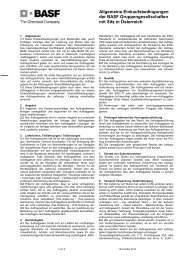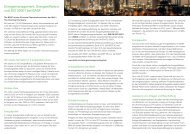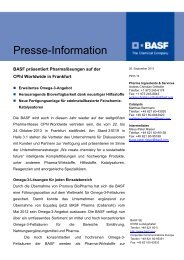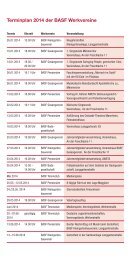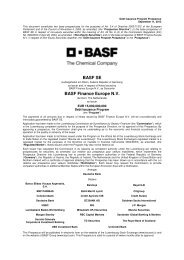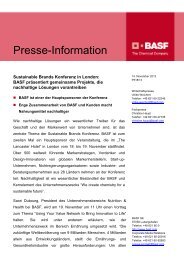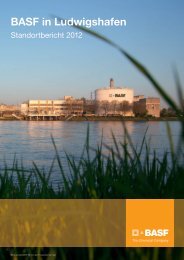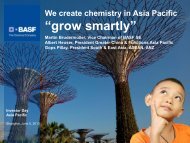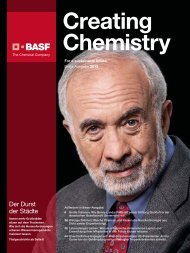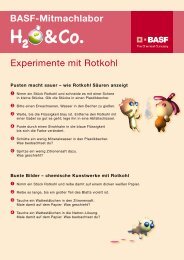Perfect silicon disks - BASF.com
Perfect silicon disks - BASF.com
Perfect silicon disks - BASF.com
Create successful ePaper yourself
Turn your PDF publications into a flip-book with our unique Google optimized e-Paper software.
Science around us<br />
A news service provided by <strong>BASF</strong><br />
<strong>Perfect</strong> <strong>silicon</strong> <strong>disks</strong><br />
Microchip manufacturers rely on high purity <strong>BASF</strong> chemicals<br />
Christian Böhme<br />
Corporate Media Relations<br />
phone +49(0)621 60-20130<br />
P 104e<br />
When <strong>com</strong>puters were first produced, technicians were able to solder transistors by hand.<br />
Today’s tiny circuits call for a different technique. The modern technology for etching transistors<br />
onto wafers is called photolithography. In this process, specialists first apply a barrier<br />
layer to the <strong>silicon</strong> which they illuminate using a mask. The layer dissolves at the sites<br />
exposed to light and the underlying <strong>silicon</strong> layer is etched. Chip manufacturers treat the<br />
etched locations with chemicals and repeat the process a number of times, building up<br />
transistors layer by layer, like building houses from layers of blocks.<br />
Finished transistors will not work if more than one atom out of a million is faulty. But dirt is<br />
everywhere. Metal devices invariably give off unwanted atoms. Humans transmit impurities<br />
by a mere touch or breath. That’s not counting the approximately half a billion particles of<br />
dust floating around a normal room. For this reason every step of chip manufacture takes<br />
place in pristine working areas where all the furnishings are plastic and filters are installed<br />
to remove the last particle of dust from the ambient air. Anyone entering these facilities<br />
must wear a full set of protective gear including gloves and a face mask.<br />
“Finished microchips must be absolutely free of contaminants, so the chemicals that are<br />
used in their manufacture have to be extremely pure,” explains Dr. Karl-Rudolf Kurtz, head<br />
of <strong>BASF</strong>’s Electronic Materials business unit. “<strong>BASF</strong> currently supplies around 30 chemicals<br />
of electronic grade purity.” <strong>BASF</strong> is equipped with cleanroom labs to check the chemicals’<br />
purity before they are delivered to chip manufacturers. “We have the technology to detect<br />
impurities in trace amounts of less than one microgram per tonne of product. That’s like a<br />
needle in 100,000 haystacks. Detecting tiny concentrations of these magnitudes is only<br />
possible with state of the art spectrometry.”


